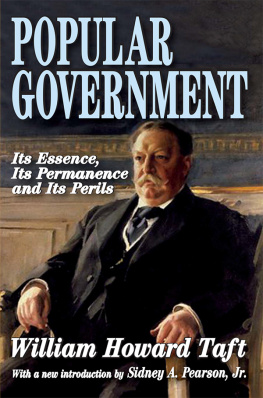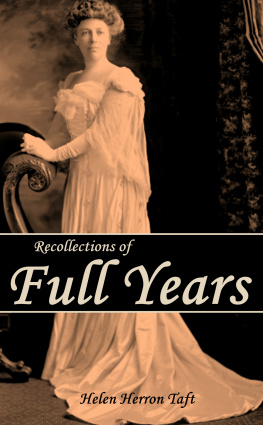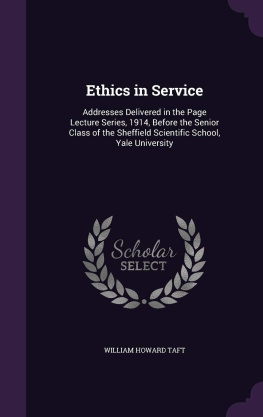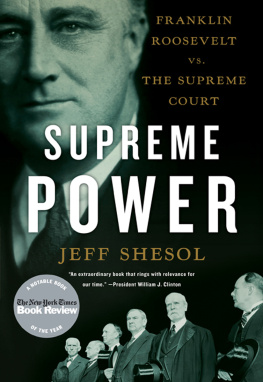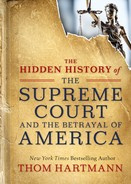Originally published in 1913 by Yale University Press in New Haven, CT.
Published 2009 by Transaction Publishers
Published 2017 by Routledge
2 Park Square, Milton Park, Abingdon, Oxon OX14 4RN
711 Third Avenue, New York, NY 10017, USA
Routledge is an imprint of the Taylor & Francis Group, an informa business
Copyright 2009 by Taylor & Francis.
All rights reserved. No part of this book may be reprinted or reproduced or utilised in any form or by any electronic, mechanical, or other means, now known or hereafter invented, including photocopying and recording, or in any information storage or retrieval system, without permission in writing from the publishers.
Notice:
Product or corporate names may be trademarks or registered trademarks, and are used only for identification and explanation without intent to infringe.
Library of Congress Catalog Number: 2009000231
Library of Congress Cataloging-in-Publication Data
Taft, William H. (William Howard), 1857-1930
Popular government : its essence, its permanence and its perils /
William Howard Taft, with a new introduction by Sidney A. Pearson.
p. cm.
Originally published: New Haven, CT : Yale University Press. 1913.
Includes bibliographical references and index.
ISBN 978-1-4128-1044-9 (alk. paper)
1. United States--Politics and government--Philosophy. I. Title.
JK1726.T34 2009
320.973--dc22
2009000231
ISBN 13: 978-1-4128-1044-9 (pbk)
William Howard Tafts political resume is impressive; he served as the twenty-third president of the United States from 1909-1913 and as Chief Justice of the Supreme Court from 1921-1930. He is the only person to have held the highest office in two of the three branches of American government. Unfortunately for his general reputation as president, his presidency was sandwiched betwee the towering presidential personalities of Theodore Roosevelt from 1901-1909, for whom Taft served as Vice President from 1905-1909, and Woodrow Wilson from 1913-1921. To top it off, he finished third in the three-way presidential election of 1912 to both Roosevelt and Wilson while amassing the lowest popular vote total for any presidential candidate representing one of the two major parties since the invention of the two-party system. Whatever personal and political virtues might be ascribed to Taft, no one has ever argued that he could compete with either of these two presidents in terms of charismatic personality. He did not particularly like retail politics and was a far happier while serving as Chief Justice of the Supreme Court than during his tenure as president. In addition, both Roosevelt and Wilson have been viewed through the lens of progressive historiography, the dominant tradition in American historiography, as heralding the birth of the modern presidency. It is this perspective which has made Taft appear to be no more than a conservative, if not reactionary, counterpoint to the progressive argument that the presidency is the heart and soul of the American political system. Why bother to read someone irrelevant to the development of modern American politics?
But it is precisely because Taft is not associated with the modern presidency that makes him worth revisiting. The modern presidency has come to be seen as increasingly problematic by persons of the most diverse political views and on all sides of the political spectrum. Students of American politics are not only obliged to ask why this does seems to be so? but also to offer some account of why the dominant progressive view of the modern presidency itself has become so problematic. Taft, his administration and his political thought, is a good place to look to try to unravel some of theoretical problems associated with the modern presidency. While we should always be mindful of the specific politics of his administration, the core problems associated with the modern presidency require an inquiry into the foundational principles of the presidency itself. We shall not be remiss, therefore, if we begin our discussion of Tafts presidency by focusing on his foundational arguments about the nature of the presidency and then the larger constitutional context in which all such arguments over institutions take place. We start with his post-presidential writings in which he had an opportunity to reflect on the ideas and politics surrounding him in the midst of what we rightly call the Progressive Era.
Tafts own interpretation of his presidency and of the office in general, published as Our Chief Magistrate and His Powers (1916), is typically treated as a footnote to the presidency of the Republican Roosevelt. While Taft was not a gifted politician as were Roosevelt and Wilson, his post-presidential reflections on the nature of American government are among the most thoughtful of any ex-president. In it he wrote from a perspective that is absolutely unique in American thought. His constitutional views are especially pertinent in the wake of the post-Vietnam and post-Watergate arguments over the nature of executive powers and when the liberal-progressive tradition of constitutional interpretation has become more controversial than at any time since its origins at the turn of the twentieth century. The return to a reconsideration of Tafts views on both executive power and constitutional interpretation is therefore in order. But such reconsideration is not rooted in a nostalgic wish to return to another time and place of constitutional interpretation: it may be too late for that however attractive it may seem on the surface. Rather it is to try to better understand how and why the Progressive Movement marks one of the major turning points in American political thought and to better understand that turning point from the vantage point of one of its most perspicuous contemporary critics. It is prompted first and foremost by a concern over the nature of the American regime. How important are the founding principles of the regime both for our self-understanding as a people and for our daily exercise of citizenship in the Republic? Are the founding principles something to be overcome in order to realize what Herbert Croly once called the promise of American life? Or are these same principles the basis for a decent form of popular government that we abandon at our collective peril? These are the fundamental questions addressed by Taft in Popular Government (1913) and they remain our questions a century later.
The view of Taft as a run-of-the-mill president is not entirely mistaken, although it has been exaggerated by more than one historian. This academic judgment is rooted in the notion that Roosevelt and Wilson are convenient reference points for the rise of the modern presidency, and Taft does not fit the liberal-progressive profile of what the modern chief executive should be. The bias of most presidential scholars has always been toward an activist presidency and a conservative activist seems to be an oxymoron. But it is precisely the criteria liberal-progressives have used to define the presidency and interpret American democracy that is the issue here. Activism to what end? Are some ends destructive of the foundations of a republican political science that is the heart of the founders defense of constitutional government? The general intellectual structure of the progressive interpretation of American democracy in general and the presidency in particular needs to be rethought and reinterpreted as the consequences of the progressive assault on the Founders constitutional principles have become more evident.


